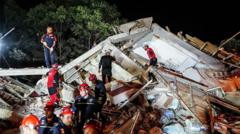More than 200 individuals remain unaccounted for in Buner district, with the toll of the monsoon season continuing to rise amid widespread devastation.
Devastating Floods Leave Over 200 Missing in North-West Pakistan

Devastating Floods Leave Over 200 Missing in North-West Pakistan
Recent monsoon floods and landslides in Pakistan have resulted in hundreds of missing persons and fatalities.
As the aftermath of severe monsoon floods hit north-west Pakistan, local officials report that over 200 people are still missing in Buner district. Flash flooding and landslides have wreaked havoc, leading to the deaths of more than 300 individuals across Pakistan and Pakistan-administered Kashmir in recent days. Jehangir Khan, a representative from the deputy commissioner's office in Buner, indicated that at least 209 people remain untraceable, and the number may increase as rescue operations continue.
Compounding the tragedy, eight bodies have been interred without identification due to the absence of surviving family members, as damaged roads impede recovery efforts. In addition, a provincial rescue spokesperson informed AFP that around "10 to 12 entire villages" have faced partial burial under debris. Asfandyar Khattak, the head of the provincial disaster management authority, highlighted that other districts, such as Shangla, are also grappling with missing persons.
With monsoon rains typically delivering three-quarters of South Asia's annual precipitation, scientists have raised concerns that climate change is magnifying the severity and frequency of such weather events. Recent rainfall has not solely impacted Pakistan; Indian-administered Kashmir has also experienced heavy downpours, which recently claimed at least 60 lives. In Pakistan-administered Kashmir, nine fatalities were reported this week, accompanied by five additional deaths in Gilgit-Baltistan.
The meteorological office anticipates continued heavy rainfall in north-west Pakistan until August 21, leading to the declaration of several areas as disaster zones. An alarming statistic reveals that over 650 lives have been lost due to this year's monsoons since June. In July, Punjab province recorded a staggering 73% increase in rainfall compared to the previous year and has accounted for more deaths than in the entire prior monsoon season.
Northern Pakistan, known for its extensive glaciers, faces accelerated melting and retreat from climate change effects, increasing the risk of rock and soil dislodging. While the precise cause of recent floods and landslides is still under investigation, glaciologists emphasize that glacial melt is likely a contributing factor to this year's deadly weather events.
Compounding the tragedy, eight bodies have been interred without identification due to the absence of surviving family members, as damaged roads impede recovery efforts. In addition, a provincial rescue spokesperson informed AFP that around "10 to 12 entire villages" have faced partial burial under debris. Asfandyar Khattak, the head of the provincial disaster management authority, highlighted that other districts, such as Shangla, are also grappling with missing persons.
With monsoon rains typically delivering three-quarters of South Asia's annual precipitation, scientists have raised concerns that climate change is magnifying the severity and frequency of such weather events. Recent rainfall has not solely impacted Pakistan; Indian-administered Kashmir has also experienced heavy downpours, which recently claimed at least 60 lives. In Pakistan-administered Kashmir, nine fatalities were reported this week, accompanied by five additional deaths in Gilgit-Baltistan.
The meteorological office anticipates continued heavy rainfall in north-west Pakistan until August 21, leading to the declaration of several areas as disaster zones. An alarming statistic reveals that over 650 lives have been lost due to this year's monsoons since June. In July, Punjab province recorded a staggering 73% increase in rainfall compared to the previous year and has accounted for more deaths than in the entire prior monsoon season.
Northern Pakistan, known for its extensive glaciers, faces accelerated melting and retreat from climate change effects, increasing the risk of rock and soil dislodging. While the precise cause of recent floods and landslides is still under investigation, glaciologists emphasize that glacial melt is likely a contributing factor to this year's deadly weather events.



















